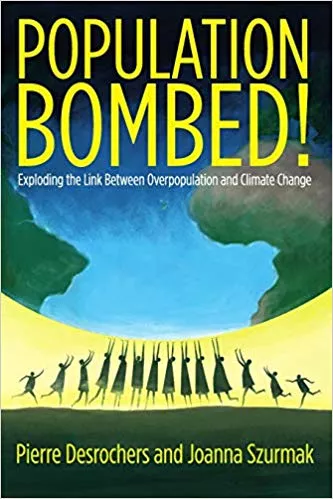Debunking the 'population bomb'

The dire warnings are everywhere these days about catastrophic climate change, particularly the perils of overpopulation and the burning of fossil fuels.
UTM’s Pierre Desrochers and Joanna Szurmak see it another way. In a new book, Desrochers, an associate professor of geography, and Szurmak, a research services librarian, caution that “population alarmism” and campaigns against carbon will stifle development, innovation and the creativity necessary to solve global problems.
Titled Population Bombed! Exploding the Link Between Overpopulation and Climate Change,the book’s publication comes 50 years after The Population Bomb, by Stanford University biology professor Paul Ehrlich, caused a sensation by predicting imminent environmental collapse followed by mass starvation.
Debunking Ehrlich’s theory started as a policy paper that the two were commissioned to write by a UK think-tank, timed to coincide with that book’s 50th anniversary. Desrochers, who specializes in energy and food policy, expanded the paper into a book along with Szurmak, who is writing a dissertation on human creativity as a doctoral candidate in science and technology studies at York University.
Desrochers and Szurmak write in their book that the predictions of doomsters have not been borne out by reality, and this is not the time to listen to them.
Desrochers notes that “population-growth catastrophism” dates back thousands of years, although it is now mostly associated with the British economist Thomas Malthus, who wrote a book in 1798 warning that population growth would outrun the food supply. The most successful proponent of this theory in more recent times was Ehrlich, a charismatic speaker who fired up a generation of activists in 1968 with the best-selling The Population Bomb. Indeed, Desrochers says that Ehrlich was such a cause célèbre that he appeared more than 20 times on The Tonight Show with Johnny Carson.
On the other side of the equation was Julian Simon, whose 1981 book The Ultimate Resource decoupled population growth from resource depletion, food shortages and other barriers to progress. Desrochers recalls that after reading a magazine article profiling Simon’s worldview, “I was hooked.” His own research with Szurmak adds more interdisciplinary insights into Simon’s discussion of creativity’s role in reducing the negative impact of development.
“The more people there are, the more brains there are…the more brains there are, the greater combinations of things we can create and we can come up with [as] solutions to our problems,” says Desrochers. The pessimists meanwhile feel that “people show up, use resources and don’t give anything back,” Szurmak explains, disregarding humanity’s “generative capability,” and the fact that population growth will bring a more diverse knowledge base.
Their book “challenges some sacred cows of the environmental movement,” says Szurmak, who complains that assumptions by environmentalists are flawed, while she and Desrochers are “scrupulously honest about our data and our intellectual commitment to the truth.”
Their support for the burning of fossil fuels is based on their findings that “the cost of energy rationing is greater than the benefit,” Desrochers says, noting that “there are no real-world alternatives” to carbon use, which is the only way to bring one billion of the world’s people out of grinding poverty. He’s quick to say that he and Szurmak are not pandering to big business or in the pockets of the oil companies. “We’re still waiting for our cheques, which have not materialized,” he quips.
Szurmak, who has a graduate degree in electrical engineering, says that they are not climate skeptics or deniers but are “pro-science, pro-creativity and pro-economic development.”
The authors are working hard to market Population Bombed! but Desrochers says “I think it’s going to be a bit of a slow burn.” They hope to provoke discussion about their theory that “stopping the use of carbon fuels now is about the worst investment we can make in our future,” he says.
Once living standards are better in developing countries, science, technology and creativity will be harnessed to clean up the environment, Szurmak adds. “We are going to innovate out of it.”



